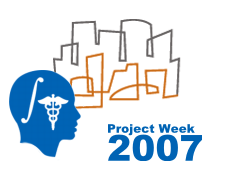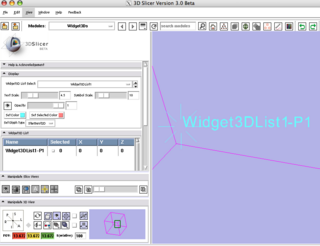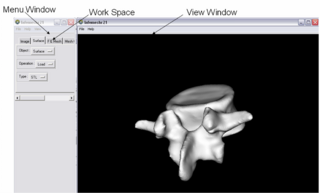Difference between revisions of "Collaboration/Iowa/Meshing/Adding VTK Interactive WWidgets to Slicer3"
| (16 intermediate revisions by 4 users not shown) | |||
| Line 1: | Line 1: | ||
| − | [[2007_Programming/Project_Week_MIT]] | + | {| |
| + | |[[Image:ProjectWeek-2007.png|thumb|320px|Return to [[2007_Programming/Project_Week_MIT|Project Week Main Page]] ]] | ||
| + | |[[Image:3dwidgets-into-slicer-062707.png|thumb|right|320px|Preliminary Widget Lists in Slicer.]] | ||
| + | |[[Image:After1.png|thumb|right|320px|Standalone GUI using kwwidgets.]] | ||
| + | |} | ||
| + | |||
| + | |||
__NOTOC__ | __NOTOC__ | ||
| Line 22: | Line 28: | ||
<h1>Approach, Plan</h1> | <h1>Approach, Plan</h1> | ||
| − | + | The plan for project week is to brainstorm on the best way to integerate the widgets that have been developed at the University of Iowa into Slicer3. Several SLicer3 team members may be consulted to help with this effort.</div> | |
| − | |||
| − | |||
| − | </div> | ||
<div style="width: 40%; float: left;"> | <div style="width: 40%; float: left;"> | ||
| Line 31: | Line 34: | ||
<h1>Progress</h1> | <h1>Progress</h1> | ||
| − | + | (Accomplishment #1) We created a new MRML nodetype for 3D widgets and made progress in the MRML tree management logic to allow users to create, edit, and manage 3D widgets in the persistent MRML scene. This infrastructure is needed for the special type of editing widget that is used for building FE meshes. This is not for instances of the 3D widgets that would be closely associated with the Slicer 3D view window. | |
| + | |||
| + | (Accomplishment #2) We continued the conversion of a standalone FE Mesh generation application from using the FLTK GUI to using KWWidgets. This will allow us to investigate the human factors issues in the GUI panel designs for the future Slicer3 FE mesh generation module. | ||
| + | |||
| + | * Next Steps: | ||
| + | ** Meeting Scheduled for August 6 +/- | ||
| + | ** Implement Kiran's Bounding Box Widget in MRML/Slicer3 (Curt) | ||
| + | ** Create command line module to read MRML bounding box info to create model (surface mesh) (Kiran with Curt's help) | ||
| + | * Longer term: | ||
| + | ** Implement Unstructured Grid MRML representation and corresponding display/GUI code (Curt) | ||
</div> | </div> | ||
| Line 41: | Line 53: | ||
===References=== | ===References=== | ||
| − | * | + | * Shivanna K, Adams BD, Magnotta VA, Grosland NM. "Automating Patient-specific Finite Element Model Development", MICAII 2006. |
| − | * | + | * Shivanna KH, Grosland NM, Russell ME, Pedersen DR. "Diarthrodial Joint Contact Models: Finite element model development of the human hip", In Press. |
| − | |||
| − | |||
Latest revision as of 12:53, 29 June 2007
Home < Collaboration < Iowa < Meshing < Adding VTK Interactive WWidgets to Slicer3 Return to Project Week Main Page |
Key Investigators
- Iowa: Kiran Shivanna, Vincent Magnotta, Nicole Grosland
- Isomics: Steve Pieper
- Knowledge Vis: Curt Lisle
- Kitware: Will Schroeder
Objective
Work on integration of the new VTK 3D Widgets into Slicer3 for generation of finite element models. This will also include adding support for structured and unstructered grids into Slicer3
Approach, Plan
The plan for project week is to brainstorm on the best way to integerate the widgets that have been developed at the University of Iowa into Slicer3. Several SLicer3 team members may be consulted to help with this effort.Progress
(Accomplishment #1) We created a new MRML nodetype for 3D widgets and made progress in the MRML tree management logic to allow users to create, edit, and manage 3D widgets in the persistent MRML scene. This infrastructure is needed for the special type of editing widget that is used for building FE meshes. This is not for instances of the 3D widgets that would be closely associated with the Slicer 3D view window.
(Accomplishment #2) We continued the conversion of a standalone FE Mesh generation application from using the FLTK GUI to using KWWidgets. This will allow us to investigate the human factors issues in the GUI panel designs for the future Slicer3 FE mesh generation module.
- Next Steps:
- Meeting Scheduled for August 6 +/-
- Implement Kiran's Bounding Box Widget in MRML/Slicer3 (Curt)
- Create command line module to read MRML bounding box info to create model (surface mesh) (Kiran with Curt's help)
- Longer term:
- Implement Unstructured Grid MRML representation and corresponding display/GUI code (Curt)
References
- Shivanna K, Adams BD, Magnotta VA, Grosland NM. "Automating Patient-specific Finite Element Model Development", MICAII 2006.
- Shivanna KH, Grosland NM, Russell ME, Pedersen DR. "Diarthrodial Joint Contact Models: Finite element model development of the human hip", In Press.

